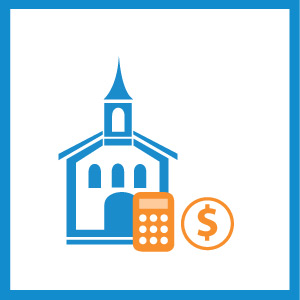How Diocesan Organizations Can Unleash the Power of Cloud Accounting
If running the finances at a religious organization is a challenge, running the finances at a diocesan organization takes that challenge and multiplies it. Not only do you have to lead financial decision making for multiple funds within one organization, you have to oversee the financial decision making for multiple funds in multiple locations.
The Diocesan CFO Oversees Dozens, if not Hundreds of Separate Entities
While each parish, school, or charitable entity may have its own finance manager and board to whom he or she must answer, the financial team at the diocesan level has to be able to roll up all of the information into a single source of truth. For example, the financial team at our local Catholic dioceses receives reports from:
- 50 Parishes (some dioceses have over 100)
- 3 High Schools
- 13 Elementary Schools (often intertwined with parishes), 2 Private Elementary Schools, 3 Pre-Schools
- A regional Seminary
- 3 Missions
- A Diocesan Cemetery (not including parish cemeteries)
- A Newspaper, a Television Program, and more.
Simply put, managing a diocese is not only vast, it is complex—with different levels of control and autonomy for each entity, different financial structures and reporting needs. In addition to this, the diocesan CFO may have partial or complete financial oversight for one or more Catholic Charities, which in turn have multiple funds and programs.
Managing Multiple Entities is a Challenge in Itself, Doing So on the Strict Budget of a Faith-Based Organization Makes it Tougher
Not only are you managing all of this, you are managing all of this on a much stricter budget, with stricter oversight, and more stakeholders. You need to report quickly and accurately, address problem areas immediately, and find a balance between unity and granularity.
What makes this harder is that you often don’t have the massive budget for an upgrade and implementation project with huge upfront costs. This leaves you with two options:
- Keep on with the status quo:
- Put faith into your ability to roll up all of the numbers with outdated, manual technology
- Try to push forward with disparate systems and processes across multiple entities
- Attempt to get a unified, single source of truth each month.
- Leverage the Power of the Cloud:
- Take advantage of an accounting and ERP software designed to provide low upfront costs and transparent monthly pricing.
- Get real insight into the numbers with configurable, easy, point-and-click filtering of real time data.
- Drill down into the numbers of each parish, school, cemetery, or program.
- Unify processes across every entity to save time each month.
- Track the performance of multiple entities, gaining real insight into the metrics and performance of each on your schedule.
Intacct: Accounting Software for Diocesan Organizations
Intacct has provided accounting software for both faith-based and multi-entity organizations for nearly two decades, and has handled everything from single-location churches to multinational, multi-entity companies. Consider this: Intacct is built for growth, able to handle the needs of organizations with:
- 100s of entities: Intacct automates multi-entity management and financial consolidations for customers with hundreds of locations in their organization
- 1,000s of users: Our biggest customers are improving productivity with up to thousands of users on Intacct
- 100,000s of transactions: Customers are quickly and securely processing hundreds of thousands of daily transactions with Intacct
The only cloud financial management system endorsed by the American Institute of CPAs, Intacct can help you to strengthen stewardship, gain efficiency, and grow funding. The video below shares with you just how effective Intacct is at managing the finances at your diocesan organization:
Leverage the Cloud: Webcast for Diocesan Organizations
As a reseller of Intacct for religious and multi-entity organizations, we are well positioned to help you leverage the power of cloud accounting. We invite you to learn more about the software and its functionality by registering for an upcoming Intacct webcast, How Diocesan Organizations are Improving Stewardship with Modern Technology, in which experts will present challenges and opportunities for diocesan organizations, sharing:
- How to reduce manual processes
- How to automate financial, compliance, and operational reporting
- How to gain real time insight for outcomes, performance, and impact
- How to remain GAAP compliant under old and upcoming rules
Running the finances at a diocesan organization is complex, but by leveraging the power of the cloud, you can take control of diocesan fiscal management. Register here for the webcast, learn more about Intacct for diocesan organizations, and contact rinehimerbaker for more information.




